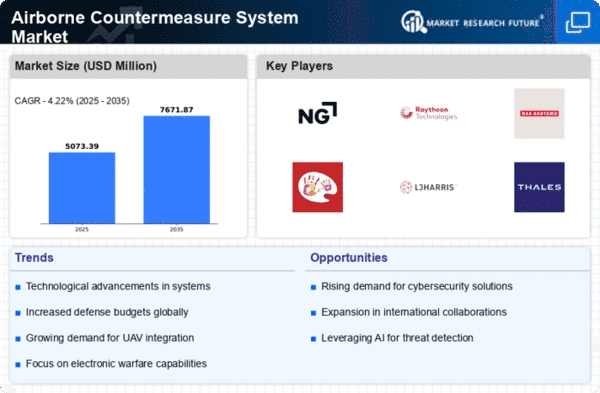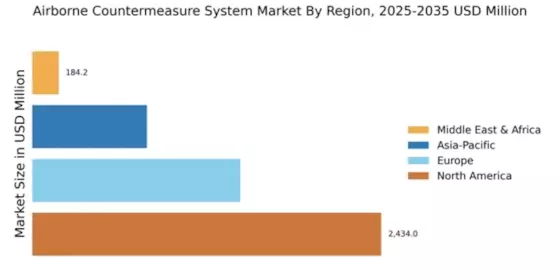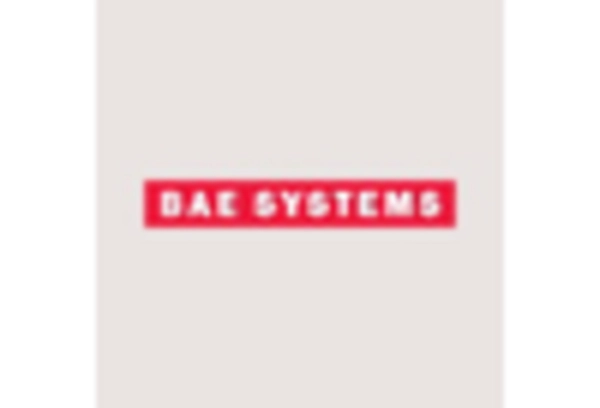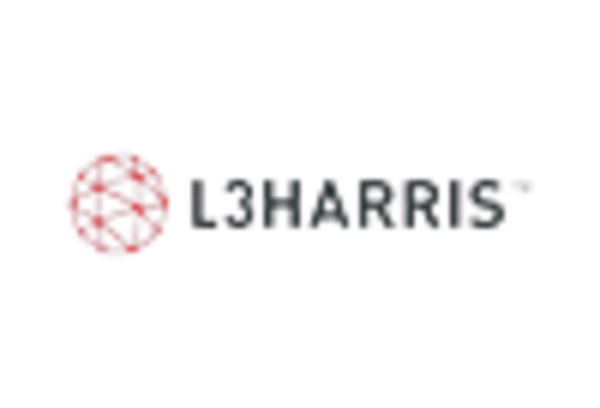Increased Defense Budgets
The airborne countermeasure system Market is significantly influenced by the rising defense budgets of various nations. Governments are prioritizing the enhancement of their military capabilities, particularly in the realm of aerial defense. Recent reports indicate that defense expenditures are expected to grow by an average of 3 to 5% annually over the next five years. This increase is largely driven by the need to address emerging threats and to modernize existing defense systems. As nations allocate more resources towards advanced airborne countermeasures, the market is likely to witness substantial growth, reflecting the strategic importance of maintaining air superiority.
Technological Innovations
Technological advancements play a pivotal role in shaping the Airborne Countermeasure System Market. Innovations in radar jamming, electronic warfare, and missile defense systems are enhancing the effectiveness of airborne countermeasures. The integration of artificial intelligence and machine learning into these systems is particularly noteworthy, as it allows for real-time threat assessment and response. Recent data indicates that the market for electronic warfare systems alone is projected to reach USD 20 billion by 2026, highlighting the increasing reliance on sophisticated technologies. Consequently, the Airborne Countermeasure System Market is likely to expand as defense contractors invest in cutting-edge solutions to meet the demands of modern warfare.
Rising Geopolitical Tensions
The Airborne Countermeasure System Market is experiencing a surge in demand due to escalating geopolitical tensions across various regions. Nations are increasingly investing in advanced defense systems to safeguard their airspace from potential threats. This trend is underscored by a notable increase in military budgets, with many countries allocating a significant portion to enhance their airborne capabilities. For instance, defense spending in several nations has risen by approximately 5 to 10% annually, reflecting a strategic pivot towards strengthening aerial defense mechanisms. As a result, the Airborne Countermeasure System Market is poised for growth, driven by the necessity for robust countermeasures against evolving aerial threats.
Focus on Cybersecurity in Defense Systems
The increasing emphasis on cybersecurity within defense systems is becoming a critical driver for the Airborne Countermeasure System Market. As military operations become more reliant on digital technologies, the vulnerability to cyber threats has escalated. Defense agencies are now prioritizing the integration of cybersecurity measures into their airborne countermeasure systems to protect sensitive data and operational integrity. Recent studies suggest that investments in cybersecurity for defense applications could exceed USD 10 billion by 2027. This focus on securing airborne systems against cyber threats is likely to propel the growth of the Airborne Countermeasure System Market, as organizations seek to fortify their defenses against a multifaceted threat landscape.
Growing Demand for Unmanned Aerial Vehicles
The proliferation of unmanned aerial vehicles (UAVs) is reshaping the Airborne Countermeasure System Market. As UAV technology advances, there is a corresponding need for effective countermeasures to mitigate potential threats posed by these systems. The market for UAVs is projected to grow at a compound annual growth rate of over 15%, indicating a robust demand for integrated countermeasure solutions. This trend suggests that defense forces are increasingly recognizing the necessity of developing countermeasures specifically designed to neutralize UAV threats. Consequently, the Airborne Countermeasure System Market is likely to expand in response to this growing demand, as military organizations seek to enhance their operational capabilities.

















